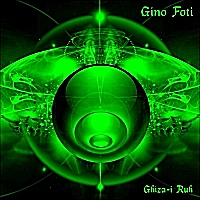|
Gino Foti - Ghiza-i Ruh
|
| |
|

|
|
Track Listing
|
Credits
Gino Foti - MIDI Bass Guitar, MIDI Bass Pedals, Loops & Samples
Overview & Composition Notes
"Music is called Ghiza-i Ruh - the food of the soul - by Sufis. Music being the most divine art elevates the soul to the higher spirit; music itself being unseen soon reaches the unseen; just as only the diamond can break the diamond, so musical vibrations are used to make the physical and mental vibrations inactive, in order that the Sufi may be elevated to the spiritual spheres." ~ Hazrat Inayat Khan
Click on the song title to stream a clip.
Ghiza-i Ruh
This release is my first foray into the meditation & spiritual music genres, inspired by the writings of Sufi mystic and master musician Hazrat Inayat Khan.
Unlike most composers in this niche, who primarily use keyboards and synthesizers, I experimented with new instrumentation and effects on my MIDI bass guitar to come up with a customized patch of several Indian, Mediterranean, and Middle-Eastern stringed instruments, including the santur (or santoor), qanun (or kanun), and Khan's beloved veena (or vina).
It is written that in order to complete their spiritual journey, a Sufi must advance through seven stages, or states of being sometimes referred to as "mystical veils", so I added drones, synth vox, and other sounds - six in total, each with a different time duration, and played everything in real-time via MIDI bass pedals, to come up with an organic composition that is both cyclical and elastic, much like the traditional Sufi whirling dervishes.
Given the concept, I used the fifth mode of E harmonic minor, or its Phrygian dominant, as the main scale. It is widely used in Indian, Mediterranean, Middle-Eastern, and Arabic music, even though it is known by many different names whether as a dastgah, maqam, or raga.
Even the artwork colors I chose where inspired by, and in accordance with, Sufi iconography: "luminous black" and "brilliant green" (the traditional color of Islam), after the final two colors of light that are supposed to provide the seeker with a recognition of the stage of their spiritual progress.
"Music is called a divine or celestial art, not only because of its use in religion and devotion, and because it is in itself a universal religion, but because of its fineness in comparison with all other arts and sciences. Every sacred scripture, holy picture, or spoken word produces the impression of its identity upon the morrow of the soul; but music stands before the soul without producing any impression of this objective world, in either name or form, thus preparing the soul to realize the Infinite.
Recognizing this, the Sufi names music Ghiza-i Ruh, the food of the soul, and uses it as a source of spiritual perfection; for music fans the fire of the heart, and the flame arising from it illumines the soul. The Sufi derives much more benefit from music in his meditations that from anything else. His devotional and meditative attitude makes him responsive to music, which helps him in his spiritual unfoldment. The consciousness, by the help of music, first frees itself from the body and then from the mind. This once accomplished, only one step more is needed to attain spiritual perfection." ~ Hazrat Inayat Khan, The Mysticism Of Sound
"The poets have said that by singing the angels induced the soul to enter the human body. The soul that has always been free is unwilling to enter the body. Really, before its incarnation the soul is sound. It is for this reason that we love sound. The breath, the speech, the step, all have rhythm. Religions have all made music part of their worship. The Sufi especially loves music, calling it Ghiza-i Ruh, food of the soul." ~ Hazrat Inayat Khan, The Supplementary Papers, Art and Music II
|

